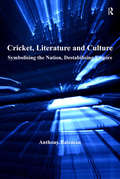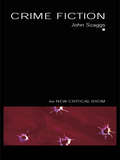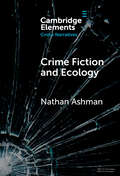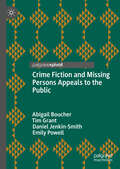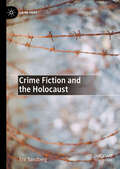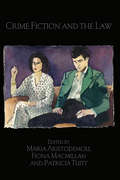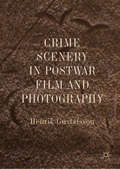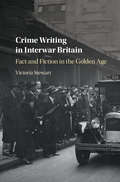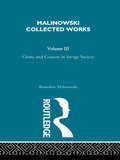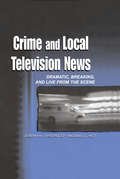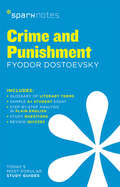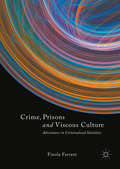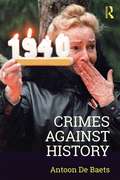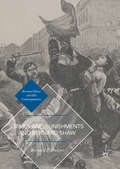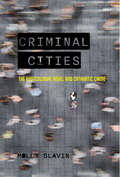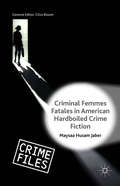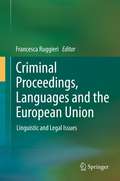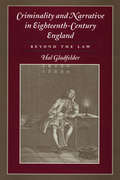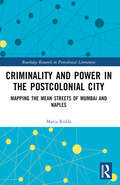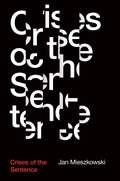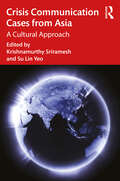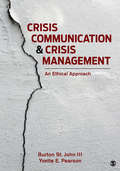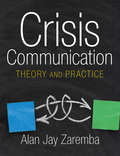- Table View
- List View
Cricket, Literature and Culture: Symbolising the Nation, Destabilising Empire
by Anthony BatemanIn his important contribution to the growing field of sports literature, Anthony Bateman traces the relationship between literary representations of cricket and Anglo-British national identity from 1850 to the mid 1980s. Examining newspaper accounts, instructional books, fiction, poetry, and the work of editors, anthologists, and historians, Bateman elaborates the ways in which a long tradition of literary discourse produced cricket's cultural status and meaning. His critique of writing about cricket leads to the rediscovery of little-known texts and the reinterpretation of well-known works by authors as diverse as Neville Cardus, James Joyce, the Great War poets, and C.L.R. James. Beginning with mid-eighteenth century accounts of cricket that provide essential background, Bateman examines the literary evolution of cricket writing against the backdrop of key historical moments such as the Great War, the 1926 General Strike, and the rise of Communism. Several case studies show that cricket simultaneously asserted English ideals and created anxiety about imperialism, while cricket's distinctively colonial aesthetic is highlighted through Bateman's examination of the discourse surrounding colonial cricket tours and cricketers like Prince Kumar Shri Ranjitsinhji of India and Sir Learie Constantine of Trinidad. Featuring an extensive bibliography, Bateman's book shows that, while the discourse surrounding cricket was key to its status as a symbol of nation and empire, the embodied practice of the sport served to destabilise its established cultural meaning in the colonial and postcolonial contexts.
Crime Fiction (The New Critical Idiom)
by John ScaggsCrime Fiction provides a lively introduction to what is both a wide-ranging and hugely popular literary genre. Using examples from a variety of novels, short stories, films and televisions series, John Scaggs: presents a concise history of crime fiction - from biblical narratives to James Ellroy - broadening the genre to include revenge tragedy and the gothic novel explores the key sub-genres of crime fiction, such as 'Rational Criminal Investigation', The Hard-Boiled Mode', 'The Police Procedural' and 'Historical Crime Fiction' locates texts and their recurring themes and motifs in a wider social and historical context outlines the various critical concepts that are central to the study of crime fiction, including gender, narrative theory and film theory considers contemporary television series like C.S.I.: Crime Scene Investigation alongside the 'classic' whodunnits of Agatha Christie. Accessible and clear, this comprehensive overview is the essential guide for all those studying crime fiction and concludes with a look at future directions for the genre in the twentieth-first century.
Crime Fiction and Ecology: From the Local to the Global (Elements in Crime Narratives)
by Nathan AshmanThis Element examines how contemporary ecological crime narratives are responding to the scales and complexities of the global climate crisis. It opens with the suggestion that there are certain formal limits to the genre's capacity to accommodate and interrogate these multifaceted dynamics within its typical stylistic and thematic bounds. Using a comparative methodological approach that draws connections and commonalities between literary crime texts from across a range of geographical locales – including works from Asia, Europe, Africa, South America, North America and Oceana – it therefore seeks to uncover examples of world crime fictions that are cultivating new forms of environmental awareness through textual strategies capable of conceiving of the planet as a whole. This necessitates a movement away from considering crime fictions in the context of their distinct and separate national literary traditions, instead emphasising the global and transnational connections between works.
Crime Fiction and Missing Persons Appeals to the Public
by Tim Grant Emily Powell Abigail Boucher Daniel Jenkin-SmithThis book draws upon genre fiction studies, forensic linguistics, and media studies to investigate the overlap between crime fiction conventions and the writing of missing persons appeals to the public. This book is based on a pilot project funded by the Aston Institute for Forensic Linguistics, entitled 'Genre, Pacing, and Narrative in Police Missing Persons Appeals' (Aug 2021-Nov 2022). The authors identify a missing persons appeal as a literary and linguistic genre in its own right and illustrate the problems that arise when the appeals writing process goes unregulated or unstudied: there is currently little-to-no official, national police guidance, regulation, or standard procedure for writing a missing persons appeal in the UK. The authors also identify opportunities for improving the writing and delivery of appeals by further (and more intentionally) applying crime fiction conventions, narrative devices, and pacing, to maximise audience reach and increase the chances of recovering a missing person. This book will be of particular interest to genre fiction scholars (particularly those interested in crime fiction), forensic linguists, and media studies scholars.
Crime Fiction and the Holocaust (Crime Files)
by Eric SandbergThis book explores a wide range of twentieth and twenty-first century international fiction that engages with the Holocaust and its historical legacy. It examines the use of tropes of crime and detection in the representation of historical atrocity in both explicit crime fiction and in literary fiction that relies on some of crime fiction&’s signature techniques. Crime Fiction and the Holocaust asks why patterns of detection have become a favoured method of fictional engagement with the Holocaust, considers the ethical and textual problematics of fictional encounters with real-world suffering, and delineates crime fiction&’s formal and thematic contributions to the broader project of Holocaust fiction.
Crime Fiction and the Law (Birkbeck Law Press)
by Maria Aristodemou Fiona Macmillan Patricia TuittThis book opens up a range of important perspectives on law and violence by considering the ways in which their relationship is formulated in literature, television and film. Employing critical legal theory to address the relationship between crime fiction, law and justice, it considers a range of topics, including: the relationship between crime fiction, legal reasoning and critique; questions surrounding the relationship between law and justice; gender issues; the legal, political and social impacts of fictional representations of crime and justice; post-colonial perspectives on crime fiction; as well as the impact of law itself on the crime fiction’s development. Introducing a new sub-field of legal and literary research, this book will be of enormous interest to scholars in critical, cultural and socio-legal studies, as well as to others in criminology, as well as in literature.
Crime Scenery in Postwar Film and Photography
by Henrik GustafssonThis book offers a rare and innovative consideration of an enduring tendency in postwar art to explore places devoid of human agents in the wake of violent encounters. To see the scenery together with the crime elicits a double interrogation, not merely of a physical site but also of its formation as an aesthetic artefact, and ultimately of our own acts of looking and imagining. Closely engaging with a vast array of works made by artists, filmmakers and photographers, each who has forged a distinct vantage point on the aftermath of crime and conflict, the study selectively maps the afterlife of landscape in search of the political and ethical agency of the image. By way of a thoroughly interdisciplinary approach, Crime Scenery in Postwar Film and Photography brings landscape studies into close dialogue with contemporary theory by paying sustained attention to how the gesture of retracing past events facilitates new configurations of the present and future.
Crime Writing in Interwar Britain: Fact and Fiction in the Golden Age
by Victoria StewartThe interwar period is often described as the 'Golden Age' of detective fiction, but many other kinds of crime writing, both factual and fictional, were also widely read during these years. Crime Writing in Interwar Britain: Fact and Fiction in the Golden Age considers some of this neglected material in order to provide a richer and more complex view of how crime and criminality were understood between the wars. A number of the authors discussed, including Dorothy L. Sayers, Marie Belloc Lowndes and F. Tennyson Jesse, wrote about crime in essays, book reviews, newspaper articles and works of popular criminology, as well as in novels and short stories. Placing debates about detective fiction in the context of this largely forgotten but rich and diverse culture of writing about crime will give a unique new picture of how criminality and the legal process were considered at this time.
Crime and Custom in Savage Society: [1926/1940] (Quality Paperback Ser. #No. 210)
by Bronislaw MalinowskiThis volume discusses aspects of small scale societies, including the study of the mental processes, as well as indigenous economics and law.
Crime and Local Television News: Dramatic, Breaking, and Live From the Scene (Routledge Communication Series)
by Jeremy H. Lipschultz Michael L. HiltThis volume offers an analysis of crime coverage on local television, exploring the nature of local television news and the ongoing appeal of crime stories. Drawing on the perspectives of media studies, psychology, sociology, and criminology, authors Jeremy H. Lipschultz and Michael L. Hilt focus on live local television coverage of crime and examine its irresistibility to viewers and its impact on society's perceptions of itself. They place local television news in its theoretical and historical contexts, and consider it through the lens of legal, ethical, racial, aging, and technological concerns. In its comprehensive examination of how local television newsrooms around the country address coverage of crime, this compelling work discusses such controversial issues as the use of crime coverage to build ratings, and considers new models for reform of local TV newscasts. The volume includes national survey data from news managers and content analyses from late night newscasts in a range of markets, and integrates the theory and practice of local television news into the discussion. Lipschultz and Hilt also project the future of local television news and predict the impact of social and technological changes on news. As a provocative look at the factors and forces shaping local news and crime coverage, Crime and Local Television News makes an important contribution to the discussions taking place in broadcast journalism, mass communication, media and society, and theory and research courses. It will also interest all who consider the impact of local news content and coverage.
Crime and Punishment SparkNotes Literature Guide (SparkNotes Literature Guide Series #23)
by SparkNotesCrime and Punishment SparkNotes Literature Guide by Fyodor Dostoevsky Making the reading experience fun! When a paper is due, and dreaded exams loom, here's the lit-crit help students need to succeed! SparkNotes Literature Guides make studying smarter, better, and faster. They provide chapter-by-chapter analysis; explanations of key themes, motifs, and symbols; a review quiz; and essay topics. Lively and accessible, SparkNotes is perfect for late-night studying and paper writing. Includes:An A+ Essay—an actual literary essay written about the Spark-ed book—to show students how a paper should be written.16 pages devoted to writing a literary essay including: a glossary of literary termsStep-by-step tutoring on how to write a literary essayA feature on how not to plagiarize
Crime, Prisons and Viscous Culture: Adventures in Criminalized Identities
by Finola FarrantThis unique book explores criminalized identities and the idea of 'viscous culture' to provide new understandings of crime, punishment and justice. It shows that viscous culture encourages some of us to become outlaws, monsters or shapeshifters who challenge systems of domination and forces of control. Crime, Prisons and Viscous Culture interweaves analyses of popular culture with extensive empirical research to explore both the glamorous and grotesque nature of crime, control and containment. Through encounters with numerous popular and mythological archetypes the book explores the boundaries of the criminological discipline. Criminology itself is presented as fragmented, distorted and fascinating, and the important transdisciplinary potential of criminology is highlighted. In doing so, this book will be of great interest to scholars of criminology, cultural studies, popular culture and sociological theory.
Crimes against History
by Antoon De BaetsCrimes against History takes a global approach to the extreme forms of censorship to which history and historians have been subjected through the ages. The book opens by considering the varieties of censorship, from suppression, dismissal, and defamation to persecution and murder. Part I, "Kill switch," tells the tragic story of how the censorship of history has sometimes turned into deadly crimes against history, with chapters looking at topics such as historians and archivists being killed for political reasons, attacks by political leaders on historians, iconoclastic breaks with the past, and fake news. Part II, "Fragile freedom," reverses the perspective and examines how the censorship of history has backfired. Chapters consider the subversive power of historical analogies and resistance to the censorship of history. The book also contains a "Provisional memorial for history producers killed for political reasons (from ancient times until 2017)". It is a double tribute: to the history producers who were killed and to those who mustered the courage to resist the blows of censorship. Comparing case studies from across the world and written from a human rights perspective, Crimes against History is an essential resource for anyone interested in how deeply history and politics influence each other, as well as for anyone wanting a fuller view of the history of history.
Crimes and Punishments and Bernard Shaw (Bernard Shaw and His Contemporaries)
by Bernard F. DukoreThis book analyzes the interaction of crimes, punishments, and Bernard Shaw in the nineteenth and twentieth centuries. It explores crimes committed by professional criminals, nonprofessional criminals, businessmen, believers in a cause, the police, the Government, and prison officials. It examines punishments decreed by judges, juries, colonial governors, commissars, and administered by the police, prison warders, and prison doctors. It charts Shaw's view of crimes and punishments in dramatic writings, non-dramatic writings, and his actions in real life. This book presents him in the context of his contemporaries and his world, inviting readers to view crimes and punishments in their context, history, and relevance to his ideas in and outside his plays, plus the relevance of his ideas to crimes and punishments in life.
Criminal Cities: The Postcolonial Novel and Cathartic Crime (Cultural Frames, Framing Culture)
by Molly SlavinWhy does crime feature at the center of so many postcolonial novels set in major cities? This book interrogates the connections that can be found between narratives of crime, cities, and colonialism to bring to light the ramifications of this literary preoccupation, as well as possibilities for cultural, aesthetic, and political catharsis.Examining late-twentieth- and twenty-first-century novels set in London, Belfast, Mumbai, Sydney, Johannesburg, Nairobi, and urban areas in the Palestinian West Bank, Criminal Cities considers the marks left by neocolonialism and imperialism on the structures, institutions, and cartographies of twenty-first-century cities. Molly Slavin suggests that literary depictions of urban crime can offer unique capabilities for literary characters, as well as readers, to process and negotiate that lingering colonial violence, while also providing avenues for justice and forms of reparations.
Criminal Femmes Fatales in American Hardboiled Crime Fiction (Crime Files)
by Maysaa Husam JaberThis book fills a gap in both literary and feminist scholarship by offering the first major study of femme fatales in hardboiled crime fiction. Maysaa Jaber shows that the criminal literary figures in the genre open up powerful spaces for imagining female agency in direct opposition to the constraining forces of patriarchy and misogyny.
Criminal Law and the Modernist Novel
by Rex FergusonThe realist novel and the modern criminal trial both came to fruition in the nineteenth century. Each places a premium on the author's or trial lawyer's ability to reconstruct reality, reflecting modernity's preoccupation with firsthand experience as the basis of epistemological authority. But by the early twentieth century experience had, as Walter Benjamin put it, "fallen in value. " The modernist novel and the criminal trial of the period began taking cues from a kind of nonexperience - one that nullifies identity, subverts repetition, and supplants presence with absence. Rex Ferguson examines how such nonexperience colours the overlapping relationship between law and literary modernism. Chapters on E. M. Forster's A Passage to India, Ford Madox Ford's The Good Soldier, and Marcel Proust's In Search of Lost Time detail the development of a uniquely modern subjectivity, offering new critical insight to scholars and students of twentieth-century literature, cultural studies, and the history of law and philosophy.
Criminal Proceedings, Languages and the European Union: Linguistic and Legal Issues
by Francesca RuggieriThe book "Criminal proceedings, languages and the European Union: linguistic and legal issues" - the first attempt on this subject - deals with the current situation in the jurislinguistic studies, which cover comparative law, language and translation, towards the aim of the circulation of equivalent legal concepts in systems which are still very different from one another. In the absence of common cultures and languages, in criminal procedure it is possible to distinguish features that are typical of common law systems and features that are typical of civil law systems, according to the two different models of adversarial and inquisitorial trials. Therefore, the most problematic challenges are for the European Union legislator to define generic measures that can be easily implemented at the national level, and for the individual Member States to choose corresponding domestic measures that can best implement these broad definitions, so as to pursue objectives set at the European level.In this scenario, the book assesses the new framework within which criminal lawyers and practitioners need to operate under the Lisbon Treaty (Part I), and focuses on the different versions of its provisions concerning cooperation in criminal matters, which will need to be implemented at the national level (Part III). The book analyses the issues raised by multilingualism in the EU decision-making process and subsequent interpretation of legal acts from the viewpoint of all the players involved (EU officials, civil, penal and linguistic lawyers: Part II), explores the possible impact of the EU legal acts concerning environmental protection, where the study of ascending and descending circulation of polysemantic words is especially relevant (Part IV), and investigates the new legal and linguistic concepts in the field of data retention, protection of victims, European investigation orders and coercive measures (Part V).
Criminality and Narrative in Eighteenth-Century England: Beyond the Law
by Hal GladfelderStories of transgression–Gilgamesh, Prometheus, Oedipus, Eve—may be integral to every culture's narrative imaginings of its own origins, but such stories assumed different meanings with the burgeoning interest in modern histories of crime and punishment in the later decades of the seventeenth century. In Criminality and Narrative in Eighteenth-Century England, Hal Gladfelder shows how the trial report, providence book, criminal biography, and gallows speech came into new commercial prominence and brought into focus what was most disturbing, and most exciting, about contemporary experience. These narratives of violence, theft, disruptive sexuality, and rebellion compelled their readers to sort through fragmentary or contested evidence, anticipating the openness to discordant meanings and discrepant points of view which characterizes the later fictions of Defoe and Fielding.Beginning with the various genres of crime narrative, Gladfelder maps a complex network of discourses that collectively embodied the range of responses to the transgressive at the turn of the eighteenth century. In the book's second and third parts, he demonstrates how the discourses of criminality became enmeshed with emerging novelistic conceptions of character and narrative form. With special attention to Colonel Jack, Moll Flanders, and Roxana, Gladfelder argues that Defoe's narratives concentrate on the forces that shape identity, especially under conditions of outlawry, social dislocation, and urban poverty. He next considers Fielding's double career as author and magistrate, analyzing the interaction between his fiction and such texts as the aggressively polemical Enquiry into the Causes of the Late Increase in Robbers and his eyewitness accounts of the sensational Canning and Penlez cases. Finally, Gladfelder turns to Godwin's Caleb Williams, Wollstonecraft's Maria, and Inchbald's Nature and Art to reveal the degree to which criminal narrative, by the end of the eighteenth century, had become a necessary vehicle for articulating fundamental cultural anxieties and longings. Crime narratives, he argues, vividly embody the struggles of individuals to define their place in the suddenly unfamiliar world of modernity.
Criminality and Power in the Postcolonial City: Mapping the Mean Streets of Mumbai and Naples
by Maria RiddaThis book investigates the literary imaginings of the postcolonial city through the lens of crime in texts set in Naples and Mumbai from the 1990s to the present. Employing the analogy of a ‘black hole,’ it posits the discourse on criminality as a way to investigate the contemporary spatial manifestations of coloniality and global capitalist urbanity. Despite their different histories, Mumbai and Naples have remarkable similarities. Both are port cities, ‘gateways’ to their countries and regional trade networks, and both are marked by extreme wealth and poverty. They are also the sites and symbolic battlegrounds for a wider struggle in which ‘the North exploits the South, and the South fights back.’ As one of the characters of the novel The Neapolitan Book of the Dead puts it, a narrativisation of the underworld allows for a ‘discovery of a different city from its forgotten corners.’ Crime provides a means to understand the relationship between space and society/culture in a number of cities across the Global South, by tracing a narrative of postcolonial urbanity that exposes the connections between exploitation and the ongoing ‘coloniality of power.’
Crises of the Sentence
by Jan MieszkowskiThere are few forms in which so much authority has been invested with so little reflection as the sentence. Though a fundamental unit of discourse, it has rarely been an explicit object of inquiry, often taking a back seat to concepts such as the word, trope, line, or stanza. To understand what is at stake in thinking—or not thinking—about the sentence, Jan Mieszkowski looks at the difficulties confronting nineteenth- and twentieth-century authors when they try to explain what a sentence is and what it can do. From Romantic debates about the power of the stand-alone sentence, to the realist obsession with precision and revision, to modernist experiments with ungovernable forms, Mieszkowski explores the hidden allegiances behind our ever-changing stylistic ideals. By showing how an investment in superior writing has always been an ethical and a political as well as an aesthetic commitment, Crises of the Sentence offers a new perspective on our love-hate relationship with this fundamental compositional category.
Crisis Communication Cases from Asia: A Cultural Approach
by Krishnamurthy Sriramesh Su Lin YeoThis book analyzes crisis communication in Asia, focusing on how culture (broadly defined) plays a central role in the way a crisis develops and is resolved.Using the case study method, this book offers the reader glimpses of the variety of cultures in the continent, displaying the complexity of the cross-cultural process of conducting crisis communication in this diverse environment. Each of these cases addresses the onset, evolution, and resolution of the crisis. The contributors are seasoned practitioners who have done crisis communication work in this continent and have used the same framework of five environmental variables that define culture in this book: political culture, economic systems, societal culture, media systems, and activist environments.This edited volume is ideal for scholars and advanced students in public relations and strategic communication generally and crisis communication specifically.
Crisis Communication and Crisis Management: An Ethical Approach
by Yvette E. Pearson Burton St. JohnCrisis Communication and Crisis Management: An Ethical Approach is the only text on the market to provide students with the integration of ethical inquiry into the fundamentals of crisis communication.. Authors Burton St. John III and Yvette E. Pearson combine comprehensive coverage of the key skills, concepts, and theories of crisis communication with an extensive collection of contemporary case studies, giving students a strong understanding of the essential role that communicators play in moments of crisis. Students are encouraged to build upon their communication and ethical decision making skills using a variety of stakeholder inventories, hypothetical scenarios, discussion questions, and professional profiles. Students will also gain exposure to a mixture of discrete and ongoing crises, preparing them to manage both one-time crises and continuing crises.
Crisis Communication and Crisis Management: An Ethical Approach
by Yvette E. Pearson Burton St. JohnCrisis Communication and Crisis Management: An Ethical Approach is the only text on the market to provide students with the integration of ethical inquiry into the fundamentals of crisis communication.. Authors Burton St. John III and Yvette E. Pearson combine comprehensive coverage of the key skills, concepts, and theories of crisis communication with an extensive collection of contemporary case studies, giving students a strong understanding of the essential role that communicators play in moments of crisis. Students are encouraged to build upon their communication and ethical decision making skills using a variety of stakeholder inventories, hypothetical scenarios, discussion questions, and professional profiles. Students will also gain exposure to a mixture of discrete and ongoing crises, preparing them to manage both one-time crises and continuing crises.
Crisis Communication: Theory and Practice
by Alan Jay ZarembaCrises happen. When they do, organizations must learn to effectively communicate with their internal and external stakeholders, as well as the public, in order to salvage their reputation and achieve long-term positive effects. Ineffective communication during times of crisis can indelibly stain an organization’s reputation in the eyes of both the public and the members of the organization. The subject of crisis communication has evolved from a public relations paradigm of reactive image control to an examination of both internal and external communication, which requires proactive as well as reactive planning. There are many challenges in this text, for crisis communication involves more than case analysis; students must examine theories and then apply these principles. This text prepares students by: Providing a theoretical framework for understanding crisis communication Examining the recommendations of academics and practitioners Reviewing cases that required efficient communication during crises Describing the steps and stages for crisis communication planning Crisis Communication is a highly readable blend of theory and practice that provides students with a solid foundation for effective crisis communication.
